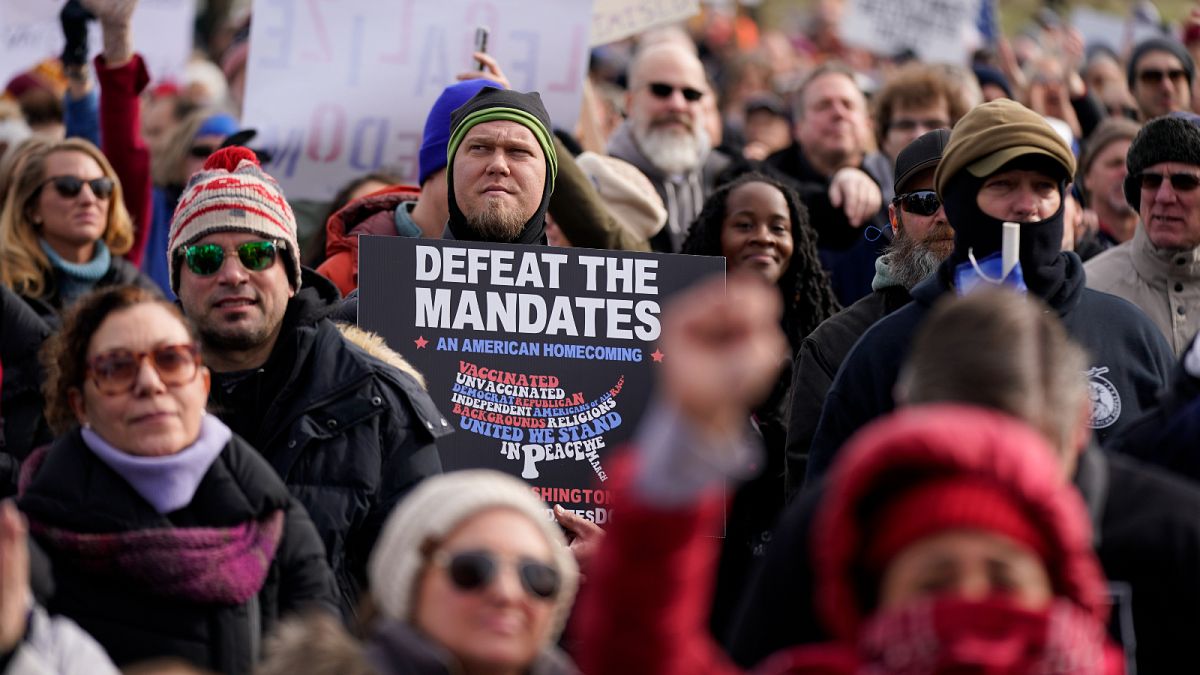From health passes to vaccine mandates, protesters were out in force this weekend.
Thousands of demonstrators from across the United States descended on Washington DC to decry COVID-19 mandates on Sunday.
Many participants, mostly maskless, shouted that the government is intervening in individual health issues after the capital adopted masks and vaccine mandates.
"People shouldn't be forced to do these things. We should have a choice," said protester Roger Miller.
The federal government had announced plans to implement a measure that requires companies with 100 or more workers to mandate the vaccine, and for some municipalities to make it mandatory for their employees to receive the jabs.
However, they were recently shut down by the US Supreme Court.
A judge in Texas ruled last Friday that President Joe Biden could not require federal employees to be vaccinated against the coronavirus and blocked the US government from disciplining employees who failed to comply.
The administration's measures would also have required people 12 and older to have at least one dose of the coronavirus vaccine to enter many indoor venues, including restaurants, bars, and gyms.
Almost two years into a pandemic that has killed more than 866,000 Americans, the number of new daily cases in the US is still over 700,000.
Meanwhile, in Europe, thousands also gathered to protest against governments' COVID-19 measures and virus vaccinations.
Belgium police use water cannons to disperse protests
Belgian police used water cannons and fired tear gas on Sunday in an attempt to disperse an estimated 50,000 people, with some thought to have travelled from France, Germany, and other countries, angry at the country's health pass and other pandemic restrictions.
"It's an international manifestation; people are coming from Holland, from Germany, from France, from Italy, from Poland," said one Belgian protester.
Protests carried signs slamming Prime Minister Alexander De Croo as well as the government's measures.
"Liberty!" was the cry as the protestors marched and violently clashed with the police.
The protest came as the Omicron wave caused infections to reach record highs across Europe.
The EU's health agency said on Friday that Omicron had now become the dominant variant circulating in the bloc and some neighbouring countries.
The country has observed protests for several weeks now, some also marred by violence, against its health pass, which provides proof of vaccination or a recent COVID test in order to enter restaurants and cultural events in particular.
Belgium's parliament said that conditions for obtaining the pass are to be tightened, although for now, they remain less strict than in France.
Belgium has seen daily infections surge to over 60,000 in the past week in what authorities have called a "tsunami".
But Omicron's effects, less severe than with the Delta variant, have enabled health systems to escape the pressure seen in previous waves.
De Croo on Friday announced that restaurants and bars could extend their opening hours, although nightclubs still remain closed.
'It's not a pandemic, it's a dictatorship'
Meanwhile, in Spain, hundreds of protesters gathered in Barcelona on Sunday to rally against restrictions adopted by both national and regional authorities to curb the Omicron-fueled surge in COVID-19 cases.
Signs read "It's not a pandemic, it's a dictatorship", as people who reject vaccines or deny the existence or the gravity of the virus marched through the city.
Local police said 1,100 people attended the march, with many not wearing facemasks and thus breaking Spain's coronavirus guidelines.
Catalan authorities on Friday lifted special measures, including nighttime curfews, that were brought in to curb a spike in new daily COVID infections that started to pick up in November.
Official data shows that the current surge is losing steam in Spain, although experts predict that rising numbers of virus-related deaths will continue for some time.
Spain, a country of 47 million, has officially recorded over nine million coronavirus cases, although the real number is believed to be much higher.
Nearly 92,000 people have died since the beginning of the pandemic, but with over 80% of Spain vaccinated, medical experts have credited the shots for saving thousands of lives and averting the total collapse of its public health system.
